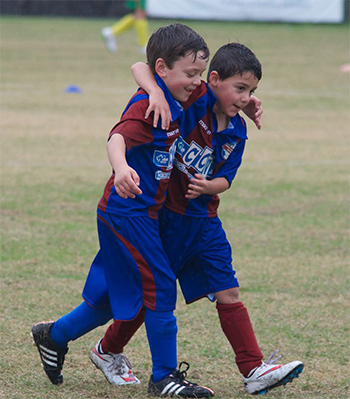Players Code of Behaviour
- Play by the rules
- Never argue with an official – if you disagree, have your captain, coach or manager approach the official during a break or after the competition
- Control your temper -verbal abuse of officials, sledging other players or deliberately distracting or provoking an opponent is not acceptable or permitted
- Work equally hard for yourself and your team – your team’s performance will benefit and so will you
- Be a good sport – applaud all good plays whether they are made by your team or the opposition
- Treat all participants in your sport as you like to be treated. Do not bully or take unfair advantage of another competitor
- Cooperate with your coach, team-mates and opponents – without them, there would be no competition
- Participate for your own enjoyment and benefit, not just to please your parents and coaches
- Respect the rights, dignity and worth of all participants regardless of their gender, ability, cultural
Coaches Code of Conduct
- Remember that young people participate for pleasure, and winning is only part of the fun
- Never ridicule or yell at a young player for making a mistake or not coming first
- Be reasonable in your demands on players’ time, energy and enthusiasm
- Operate within the rules and spirit of your sport and teach your players to do the same
- Ensure that the time players spend with you is a positive experience – all young people are deserving of equal attention and opportunities
- Avoid overplaying the talented players; the ‘just average’ need and deserve equal time
- Ensure that equipment and facilities meet safety standards and are appropriate to the age and ability of all players
- Display control, respect and professionalism to all involved with the sport. This includes opponents, coaches, officials, administrators, the media, parents and spectators, and encourage players to do the same
- Show concern and caution towards sick and injured players. Follow the advice of a physician when determining whether an injured player is ready to recommence training or competition
- Obtain appropriate qualifications and keep up to date with the latest coaching practices and the principles of growth and development of young people
- Any physical contact with a young person should be appropriate to the situation and necessary for the player’s skill development
- Respect the rights, dignity and worth of every young person regardless of their gender, ability, cultural background or religion
Parents Conduct
The behaviour of players, their parents, spectators, officials and administrators is absolutely critical in ensuring that young players enjoy an appropriate environment in their formative years of playing football. Bearing in mind that the whole philosophy of MiniRoos is based on replicating street football, where children play without adults and referees, the major focus should be on letting the children play with minimal instruction and plenty of encouragement.
Below are a series of codes of behaviour that all people involved in junior football, and in particular MiniRoos, must be aware of and abide by. Clubs may decide to have a team manager exchange a Code of Conduct before every game with each person giving an undertaking, on behalf of their players, parents and spectators, to behave in an appropriate manner. If this does not eventuate, the other team manager is entitled to refer the other person back to the Code, and if inappropriate behaviour persists, club representatives would need to become involved.
Parent Code of Behaviour
- Remember that children participate in sport for their enjoyment, not yours
- Encourage children to participate, do not force them
- Focus on your child’s efforts and performance rather than whether they win or lose
- Encourage children to play according to the rules and to settle disagreements without resorting to hostility or violence
- Never ridicule or yell at a child for making a mistake or losing a competition
- Remember that children learn best by example. Appreciate good performance and skilful plays by all participants
- Support all efforts to remove verbal and physical abuse from sporting activities
- Respect officials’ decisions and teach children to do likewise
- Show appreciation for volunteer coaches, officials and administrators – without them, your child could not participate
- Respect the rights, dignity and worth of every young person regardless of their gender, ability, cultural background or religion



